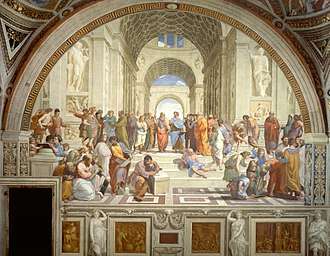
The School of Athens (1509–1511) by Raphael, depicting famous classical Ancient Greek philosophy in an idealized setting inspired by ancient Greek architecture
The history of philosophy is the study of philosophical ideas and concepts through time.
Quotes
- The historian of philosophy, whether primarily interested in philosophy or primarily interested in history, cannot help being both a philosopher and a historian. A historian of painting does not have to be a painter, a historian of medicine does not, qua historian, practise medicine. But a historian of philosophy cannot help doing philosophy in the very writing of history. It is not just that someone who knows no philosophy will be a bad historian of philosophy; it is equally true that someone who has no idea how to cook will be a bad historian of cookery.
- Anthony Kenny, A New History of Western Philosophy (2010), General Introduction
- Any serious study of philosophy will involve a mixture of historical and topic-based study, since if we don’t know about the arguments and errors of earlier philosophers, we cannot hope to make a substantial contribution to the subject. Without some knowledge of history philosophers would never progress: they would keep making the same mistakes, unaware that they had been made before. And many philosophers develop their own theories by seeing what is wrong with the work of earlier philosophers.
- Nigel Warburton, Philosophy: The Basics (Fifth ed., 2013), Introduction
See also
External links
This article is issued from
Wikiquote.
The text is licensed under Creative
Commons - Attribution - Sharealike.
Additional terms may apply for the media files.